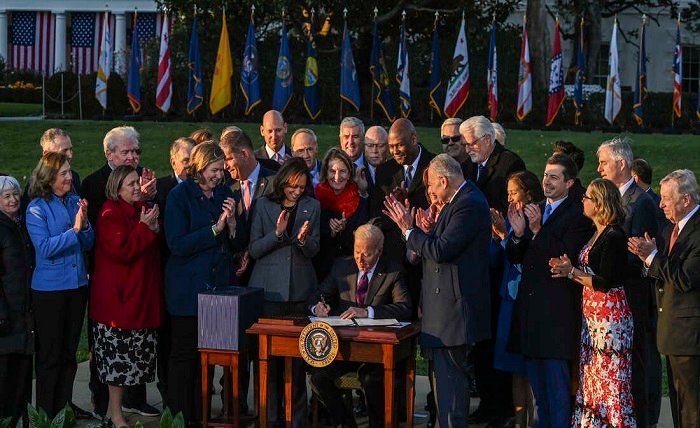How the Infrastructure Bill Could Affect the Crypto Industry

The infrastructure bill, officially known as the Infrastructure Investment and Jobs Act, is a $1.2 trillion package that aims to improve the nation’s roads, bridges, transit systems, broadband access, clean energy, and more. The bill was passed by the Senate in August 2021 and by the House of Representatives in November 2021. It is expected to be signed into law by President Joe Biden soon
However, the infrastructure bill also contains a controversial provision that could have significant implications for the crypto industry. The provision seeks to raise about $28 billion over 10 years by imposing stricter tax reporting requirements on crypto transactions. The provision has sparked a heated debate among lawmakers, regulators, industry players, and advocates over the definition, scope, and impact of the new rules.
The Crypto Provision
The crypto provision in the infrastructure bill defines a “broker” as any person who is “responsible for regularly providing any service effectuating transfers of digital assets on behalf of another person” The provision requires brokers to report information such as names, addresses, and transactions of their customers to the Internal Revenue Service (IRS) using Form 1099. The provision also requires brokers to report any transactions over $10,000 to the IRS within 15 days
The provision aims to close the tax gap between reported and actual income from crypto transactions, which is estimated to be as high as $160 billion per year. The provision also aims to enhance tax compliance and enforcement in the crypto sector, which is often seen as opaque and unregulated.
However, the provision has also raised several concerns and criticisms from various stakeholders in the crypto industry. Some of the main issues are:
- Vague and broad definition: The definition of a broker in the provision is vague and broad, potentially covering not only crypto exchanges and platforms, but also other entities and individuals that do not have access to customer information or act as intermediaries. For example, some argue that the definition could include miners, validators, node operators, software developers, hardware manufacturers, wallet providers, and even individual users who transfer crypto on their own behalf. These entities and individuals may not be able to comply with the reporting requirements or may face undue burdens and costs.
- Lack of clarity and guidance: The provision does not provide clear and specific guidance on how to implement and enforce the reporting requirements. For example, it does not specify how to determine the cost basis, fair market value, or gain or loss of crypto transactions. It also does not address how to deal with different types of crypto assets, such as stablecoins, tokens, NFTs, or DeFi products. It also does not address how to deal with different types of crypto transactions, such as swaps, loans, staking, or airdrops. Moreover, it does not address how to deal with cross-border or peer-to-peer transactions that may involve multiple jurisdictions or parties.
- Negative impact on innovation and adoption: The provision could have a negative impact on the innovation and adoption of crypto in the US. Some fear that the provision could stifle the growth and development of the crypto industry by imposing excessive regulations and compliance costs. Some also fear that the provision could drive away investors, entrepreneurs, and users from the US market to more favorable jurisdictions. Some also fear that the provision could undermine the privacy and security of crypto users by exposing their personal and financial information to third parties or hackers.
The Crypto Amendments
In response to the concerns and criticisms raised by the crypto industry and community, several lawmakers proposed amendments to modify or clarify the crypto provision in the infrastructure bill. Two of the most prominent amendments were:
- The Wyden-Lummis-Toomey amendment: This amendment was proposed by Senators Ron Wyden (D-OR), Cynthia Lummis (R-WY), and Pat Toomey (R-PA). It aimed to narrow the definition of a broker by excluding entities that do not conduct transactions on exchanges or act as intermediaries between buyers and sellers of digital assets. It also aimed to protect innovation and privacy in the crypto sector by excluding entities that validate distributed ledger transactions through proof of work or proof of stake.
- The Warner-Portman-Sinema amendment: This amendment was proposed by Senators Mark Warner (D-VA), Rob Portman (R-OH), and Kyrsten Sinema (D-AZ). It aimed to provide a compromise between the original provision and the Wyden-Lummis-Toomey amendment by excluding entities that solely engage in validating distributed ledger transactions through proof of work. However, it did not exclude entities that use proof of stake or other consensus mechanisms.
Both amendments failed to pass in the Senate due to procedural hurdles and lack of unanimous consent. However, the amendments sparked a lively and unprecedented debate on the floor and in the media about the future of crypto regulation in the US. The amendments also raised awareness and support for the crypto industry among lawmakers, regulators, industry players, and advocates.
Read more about yandex-games.com
The Future of Crypto Regulation
The infrastructure bill and its crypto provision are not the final word on crypto regulation in the US. The bill still needs to be signed into law by the president, and the provision still needs to be implemented and enforced by the IRS and other agencies. Moreover, the bill does not address other aspects of crypto regulation, such as consumer protection, anti-money laundering, securities, commodities, or banking.
Therefore, the future of crypto regulation in the US will depend on several factors, such as:
- The interpretation and guidance of the IRS: The IRS will play a key role in interpreting and providing guidance on how to comply with the reporting requirements in the provision. The IRS will need to clarify the definition, scope, and impact of the provision, as well as provide specific instructions and forms for reporting crypto transactions. The IRS will also need to coordinate with other agencies, such as the Treasury Department, the Securities and Exchange Commission (SEC), the Commodity Futures Trading Commission (CFTC), and the Financial Crimes Enforcement Network (FinCEN), to ensure consistency and coherence in crypto regulation.
- The feedback and input of the crypto industry: The crypto industry will have an opportunity to provide feedback and input to the IRS and other agencies on how to implement and enforce the provision. The crypto industry will also have an opportunity to educate and inform the IRS and other agencies on the nature, function, and potential of crypto assets and technologies. The crypto industry will also have an opportunity to advocate for fair and balanced crypto regulation that fosters innovation and adoption while protecting consumers and investors.
- The legislation and oversight of Congress: Congress will have an oversight role in monitoring and evaluating the implementation and enforcement of the provision. Congress will also have a legislative role in proposing and passing new bills or amendments that could modify or clarify the provision or address other issues related to crypto regulation. Congress will also have a representative role in reflecting and responding to the views and interests of their constituents on crypto matters.
Conclusion
The infrastructure bill and its crypto provision could have a significant impact on the crypto industry in the US. The provision seeks to raise revenue by imposing stricter tax reporting requirements on crypto transactions. However, the provision also raises concerns and criticisms over its definition, clarity, and impact on innovation and adoption. The provision also sparks a debate among lawmakers, regulators, industry players, and advocates over the future of crypto regulation in the US. The future of crypto regulation will depend on how the provision is interpreted, implemented, enforced, modified, or challenged by various stakeholders in the coming months and years.
Read more about yandex-games.com




